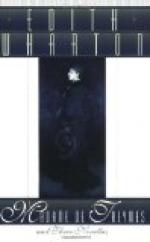Upon this state of bewilderment, this sense of having entered a room in which the lights had suddenly been turned out, even Madame de Treymes’ intensely modern presence threw no illumination. He was conscious, as she smilingly rejoined him, not of her points of difference from the others, but of the myriad invisible threads by which she held to them; he even recognized the audacious slant of her little brown profile in the portrait of a powdered ancestress beneath which she had paused a moment in advancing. She was simply one particular facet of the solid, glittering impenetrable body which he had thought to turn in his hands and look through like a crystal; and when she said, in her clear staccato English, “Perhaps you will like to see the other rooms,” he felt like crying out in his blindness: “If I could only be sure of seeing anything here!” Was she conscious of his blindness, and was he as remote and unintelligible to her as she was to him? This possibility, as he followed her through the nobly-unfolding rooms of the great house, gave him his first hope of recoverable advantage. For, after all, he had some vague traditional lights on her world and its antecedents; whereas to her he was a wholly new phenomenon, as unexplained as a fragment of meteorite dropped at her feet on the smooth gravel of the garden-path they were pacing.
She had led him down into the garden, in response to his admiring exclamation, and perhaps also because she was sure that, in the chill spring afternoon, they would have its embowered privacies to themselves. The garden was small, but intensely rich and deep—one of those wells of verdure and fragrance which everywhere sweeten the air of Paris by wafts blown above old walls on quiet streets; and as Madame de Treymes paused against the ivy bank masking its farther boundary, Durham felt more than ever removed from the normal bearings of life.




